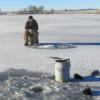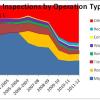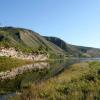Can a private resort company own a lake? If so, are the fish in the lake private or public? And can the resort keep the public from fishing in that lake? These critical questions are central to a David vs.
Environmental Law Alert Blog
Through our Environmental Law Alert blog, West Coast keeps you up to date on the latest developments and issues in environmental law. This includes:
- proposed changes to the law that will weaken, or strengthen, environmental protection;
- stories and situations where existing environmental laws are failing to protect the environment; and
- emerging legal strategies that could be used to protect our environment.
If you have an environmental story that we should hear about, please e-mail Andrew Gage. We welcome your comments on any of the posts to this blog – but please keep in mind our policies on comments.
A little more than a week ago (on February 13th), the Association of BC Forest Professionals (ABCFP) awarded its first ever “Climate Change Innovators” Award to Alex Woods, a Forest Pathologist working for the BC Government. The launch of this award, a clear statement on the importance of addressing climate change in professional forestry,
It feels a bit like déjà vu.
Once again we’re faced with a federal government study that was highly relevant to the environmental assessment of the Enbridge pipelines and tankers project, but which was not considered in the assessment because it was released too late.
You may have heard our sister organization, the West Coast Environmental Law Research Foundation, mentioned last night on CBC’s Power and Politics. We understand that a government source tipped Evan Solomon to the fact that the Research Foundation, along wi
Before your eyes glaze over, let me explain why a current BC Ministry of Environment public consultation on Administrative Penalties under the Environmental Management Act and the Integrated Pest Management Act (IPMA) matters – and is a good thing for enviro
What to make of the conclusion, courtesy of the National Energy Board’s Joint Review Panel (JRP) considering Enbridge’s proposed pipelines and tankers project, that a catastrophic spill of diluted bitumen (untreated oil sands oil, diluted so that it can be transported by pipe) on BC’s North Coast would only have a short-term impact on the enviro
When the Ministry of Forests, Lands and Natural Resource Operations (FLNRO) tries to detect violations of BC’s forest laws, do they put their efforts into detecting violations by large logging companies or small-scale operators? It turns out that small-scale operators and individuals get over half of the attention of government inspectors,
Through that contested landscape runs the Peace River, which drains east from the Rocky Mountains into the Slave River, a tributary to the Mackenzie. Thanks to the sunny southwest aspect of its slopes and long northern summer days, the valley the Peace River cuts contains a unique microclimate that makes it the only lands north of Quesnel capable of producing the widest range of food crops possible in BC, including fruit and vegetables.
[Update, 23 January 2014 - We have just posted further analysis of this data, examining the extent to which the Ministry of Forests, Lands and Natural Resource Operations has shifted compliance an










